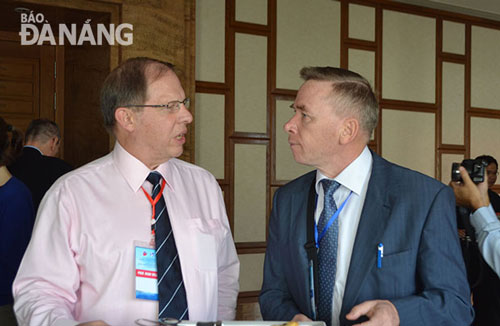Foreign scholars strongly support Viet Nam's legal sovereignty
Reporter Mai Trang from the Da Nang Newspaper recently interviewed some foreign scholars to gather their opinions about issues relating to the “Bien Dong” (East Sea). The interviewees were participants in the 6th International Conference on the Bien Dong which took place in Da Nang from 17 to 18 November.
Professor Carl Thayer from the University of New South Wales, Australian Defence Force Academy, remarked that China’s attempt to build man-made islands has made the current situation in the Bien Dong more complicated and tense. He also thought that China is unlikely to establish its military bases on these separate floating islands because of the possible difficulties of underwater and air defence. Actually, the building of the man-made islands shows China’s high-flying ambition to establish so-called “Chinese Villages” in the Bien Dong. The purpose of this unilateral action is to boost China’s sea catch output and commercial profits, and most importantly to erect its illegal sovereignty markers in the Bien Dong through which the world’s busiest international routes run.
 |
| Two foreign scholars exchanging views on the sea-related issues |
The foreign expert also noted that both the USA and Japan could each make moves to hinder China from dominating the Bien Dong. As for Viet Nam, he spoke highly of the country’s ingenuity in avoiding confrontations with the Chinese side, as well as its consistent stance on bilateral negotiations on sea-related issues. However, he stressed the significant need for Viet Nam to be highly cautious of the possibility of China’s illegal moves in the Bien Dong and to make judicious decisions, in addition to taking advantage of the strong support from the world community. These are essential for Viet Nam to safeguard its legitimate sovereignty and territorial integrity and bolster its domestic marine economic development whilst maintaining peace in the Bien Dong as well as ensuring friendly relations with China and the other parties involved in the Bien Dong issues.
Another prestigious expert, Professor James Charles Kraska from the Stockton Centre for the Study of International Law at the US Naval War College, remarked that China’s endeavour to improve maritime enforcement capacities and promote the strength of its naval forces aims to boast its image as a superpower to the world community. He reiterated that China resorted to military force to illegally occupy Viet Nam’s Hoang Sa (Paracel) archipelago in 1974, and it is now striving to realise its unjustifiable and groundless “nine-dash line” claim in the Bien Dong. Despite these moves, China cannot change Viet Nam’s legal sovereignty over its exclusive economic zone in the Bien Dong.